|
Martin Luther (Hymn-Writer, Composer) |
|
Born: 1483 - Eisleben, Saxony, Germany
Died: February 1546 - Eisleben, Saxony, Germany |
|
Martin Luther was the son of a mining family of rural origin. He attended the Latin School in Mansfeld from 1488 onwards, continuing his schooling in Magdeburg and later in Eisenach. In 1501 Luther began his studies in Erfurt and intended to become a lawyer.
In 1505, however, he made a decision that changed the course of his life radically: he decided to enter the Augustinian monastery in Erfurt. This decision shaped the rest of his life, and his search for a merciful God and His Will culminated in the development of the Reformation of the Church. Luther's negative personal experiences with the ecclesiastical means of grace resulted in not only increasing criticism of the deplorable state of affairs within the church but above all to a fundamental reconsideration of medieval theology.
His public criticism of the misuse of letters of indulgence in 1517 did not result in the desired discussion but led to the start of a court of inquisition culminating in Luther's excommunication after the Imperial Diet of Worms in 1521. Friedrich the Wise organized a "kidnapping" to protect Martin Luther's life. Luther spent almost a year as Knight George on the Wartburg, where he translated the new testament into German.
Luther's most obvious break with his monk's vows ensued when he married the former nun Katharina von Bora in June 1525. The basic unit of the protestant parish house had been born. After the Peasants' War in 1525, which Luther had disapproved of, the Reformer promoted the development of the protestant territorial church through visitations and church policies.
He died in Eisleben, the town of his birth. By order of the Elector Luther was buried in the Castle Church in Wittenberg.
With his translation of the Bible into German Martin Luther attained permanent fame as far as a unification of the German language was concerned. Today some 70 million believers on all five continents are members of the Lutheran Church. |
|
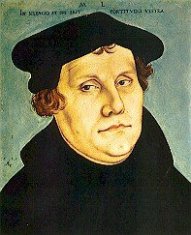
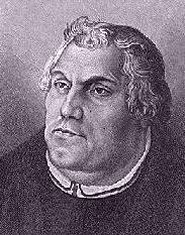
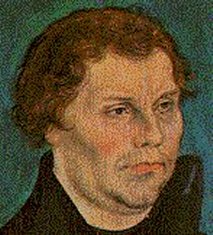
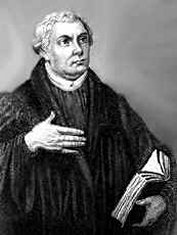
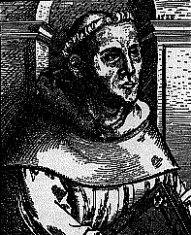 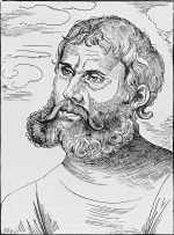
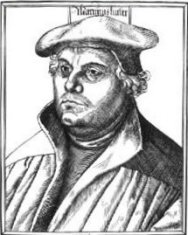
|
|
Source: Lutherstadt Wittenberg Website
Contributed by Aryeh Oron (May 2003) |
|
Martin Luther : Short Biography | Martin Luther and Bach | Luther's Deutsche Messe |
|
Texts of Bach Cantatas & Other Vocal Works |
|
BWV 2, BWV 4, BWV 6, BWV 7, BWV 14, BWV 16, BWV 36, BWV 38, BWV 42/7; BWV 59, BWV 61, BWV 62, BWV 64, BWV 69, BWV 76, BWV 80/1,2,5,8; BWV 80a/6; BWV 80b/1; BWV 83, BWV 91, BWV 95, BWV 106, BWV 119, BWV 120, BWV 120b, BWV 121, BWV 125, BWV 126/6, BWV 158, BWV 169/7; BWV 190, BWV 190a, BWV 197/5; BWV 226, BWV 243a/2a; BWV 247/38; BWV 248/9; BWV 248/3, BWV Anh 163, BWV Anh 199
BWV 260; BWV 276; BWV 277; BWV 278; BWV 279; BWV 280; BWV 293; BWV 294; BWV 298; BWV 302; BWV 303; BWV 306; BWV 308; BWV 311; BWV 312; BWV 314; BWV 317; BWV 322; BWV 363; BWV 364; BWV 370; BWV 383; BWV 385; BWV 388; BWV 437 |
|
Chorale Texts used in Bach’s Vocal Works |
|
Ach Gott, vom Himmel sieh darein (1523-1524) |
|
Allein Gott in der Höh sei Ehr (adaptation of Nikolaus Decius' original text) (1525; EKG 131) |
|
Aus tiefer Not schrei ich zu dir (Psalm 130) (1524; EKG 195) |
|
Christ ist erstanden (1533; EKG 75) |
|
Christ lag in Todesbanden (1524; EKG 76) |
|
Christ unser Herr zum Jordan kam (1524-1541; EKG 146) |
|
Christum wir sollen loben schon (1524) |
|
Der du bist drei in Einigkeit (1544; EG 470; translation of the Latin hymn O lux beata Trinitas by Ambrosius) |
|
Der Tag der ist so freudenreich (1529; NLGB 18; German translation of 14th century Latin Hymn Dies est laetitiae) |
|
Die Litanei (1528; EKG 138) |
|
Dies sind die heilgen zehn Gebot (1524; EG 231) |
|
Ein feste Burg ist unser Gott (1529) |
|
Erhalt uns, Herr, bei deinem Wort (verses 1-3, 6-7) (1542) |
|
Erstanden ist der heilig Christ (1544, Paraphraser; EKG 78; EG 105; NLGB 101), after a 1372 German translation of the Latin Hymn "Surrexit Christus hodie" |
|
Es spricht der unweisen mund wohl (1523; NLGB 250)), after Psalm 14 |
|
Es woll uns Gott genädig sein (1524; EKG 182) |
|
Gelobet seist du, Jesu Christ (1524; EKG 15) |
|
Gott der Vater wohn uns bei (1524; NLGB 136; ELG 22; EG 138), after a 15th century litany |
|
Gott sei gelobet und gebenedeiet (verses 2-3: 1524; NLGB 187; EG 214; GL 215) |
|
Herr Gott, dich loben wir [The German Tedeum] (1524/1529; EKG 137; EG 519) |
|
Jesus Christus, unser Heiland, der von uns den Gottes Zorn wandt (1524; EG 215; KGEL 205) |
|
Jesus Christus, unser Heiland, der den Tod überwand (1524; EKG 77; EG 102; KGEL 110) |
|
Komm, Gott Schöpfer, Heiliger Geist (1524; EKG 97; EG 126; KGEL 132; based on the Latin hymn Veni Creator Spiritus by Rabanus Maurus) |
|
Komm, Heiliger Geist, Herre Gott (verses 2-3): 1524; EKG 98) |
|
Mit Fried und Freud (1524; EKG 310; EG 519) |
|
Mitten wir im Leben sind (1524; NLGB 344; Gotteslob 654; EG 518; ELG 642), after the Antiphon Media vita in morte sumus |
|
Nun bitten wir den heiligen Geist (verses 2-4: 1524; NLGB 130; EG 124) |
|
Nun freut euch, lieben Christen gmein (1523; EG 341; Gemeindelieder 284; Jesus unsere Freude! 298; Sing mit 126; ELG 96) |
|
Nun komm, der Heiden Heiland (1524; EKG 1) |
|
Vater unser im Himmelreich (1539; EKG 241) |
|
Verleih uns Frieden gnädiglich (verse 1: 1529; NLGB 305; EG 421) |
|
Vom Himmel hoch, da komm ich her (1535; NLGB 13; GH 21; EKG 16; EG 24) |
|
Wär Gott nicht mit uns diese Zeit (1524; EKG 192) |
|
Wir glauben all an einen Gott (1524; NLGB 174; EG 183; KGUG 37) |
|
Chorale Melodies used in Bach’s Vocal Works |
|
Aus tiefer Not schrei ich zu dir (I) (1524; EKG 185; Zahn 4437) |
|
Christ ist erstanden (with the help of Johann Walter) (1533; Zahn 8584) |
|
Christ lag in Todesbanden (1524; Zahn 7012a) |
|
Christe, der du bist Tag und Licht (1629; Zahn 343), after early hymn Christe qui lux es et dies |
|
Christe, du Lamm Gottes (1528; Zahn 58) |
|
Die Litanei (1528; EKG 138 |
|
Ein feste Burg ist unser Gott (1529; Zahn 7377) |
|
Gelobet seist du, Jesu Christ (1524; Zahn 1947) |
|
Herr Gott, dich loben wir [The German Tedeum] (1529; Zahn 8652) |
|
Jesus Christus, unser Heiland, der den Tod überwand (1529; Zahn 1978) |
|
Komm, Gott Schöpfer, Heiliger Geist (1529, Zahn 295), based on the melody of the Latin hymn "Veni Creator Spiritus |
|
Mit Fried und Freud ich fahr dahin (1524; Zahn 3986) |
|
Nun freut euch, lieben Christen gmein (I) (1523, Zahn 4427) |
|
Nun freut euch, lieben Christen gmein (II) (Zahn 4429a), based on a 15th century melody (1529; Zahn 4429a) [probable composer] |
|
Vater unser im Himmelreich (1539; Zahn 2561) |
|
Verleih uns Frieden gnädiglich (1529: 1st half, Zahn 1945), after an early church melody |
|
Vom Himmel hoch da komm ich her (1539; Zahn 346) |
|
Wir glauben all an einen Gott (1524; Zahn 7971) |
|
Links to other Sites |
|
Lutherstadt Wittenberg, Martin Luther
Martin Luther biography (Line One)
Reformation: Martin Luther (WSU)
Island of Freedom: Martin Luther
Martin Luther: Biography of Martin Luther (Sack Lunch)
Martin Luther (The Reformation Guide) [N/A]
Portrait of Martin Luther (Boston College)
Martinus Luther - A Reformation Reference
Dr. Martin Luther to the Christian Reader
The Life & Acts of Martin Luther in English [Frazel- Sohmer]
Martin Luther's Life- The Imperial Diet of Worms
WELS: About Martin Luther - timeline
WELS: Luther - Kuske Article with Photo sidebar
Selected Works of Martin Luther (Project Wittenberg)
Online Graduate Programs: Master Of Arts History Guide: Martin Luther
The Book of Concord- Lutheran Confessions- 1529-1580 (Project Wittenberg)
Lutheran Hymnals
A Mighty Fortress is Our God
The Musical Reforms of Martin Luther
Smalcald Articles
The Smalcald Articles (Hyperlinked)
Treatise of the Power and Primacy of the Pope
The Augsburg Confession (1530)
Small Catechism (1529)
The Large Catechism of Martin Luther (1530)
Treatise on the Power and Primacy of the Pope (1537)
An Open Letter On Translating 95 Theses: Latin version & English translation
The Musical Stations of Martin Luther (Carolina Classical) |